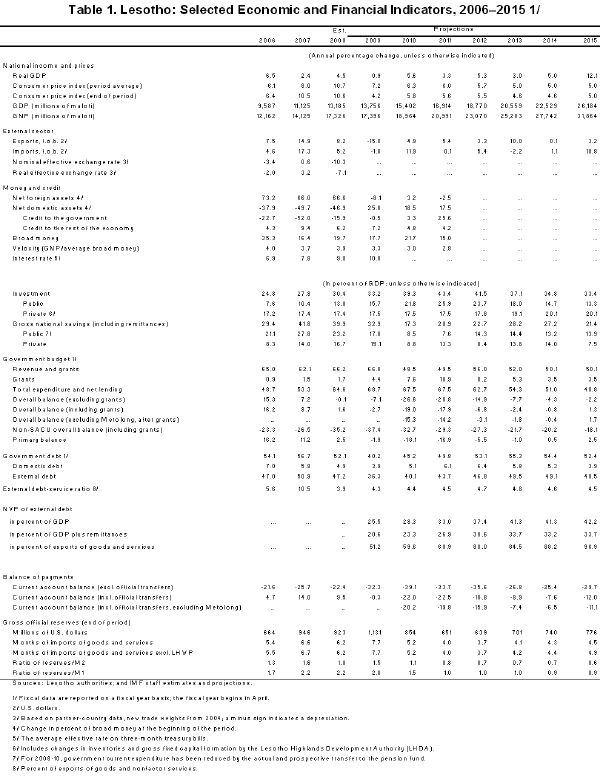Press Release: IMF Executive Board Approves US$61.4 Million Three-year ECF Arrangement for the Kingdom of Lesotho
June 2, 2010
June 2, 2010
The Executive Board of the International Monetary Fund (IMF) today approved an amount equivalent to SDR 41.88 million (about US$61.4 million) three-year arrangement for the Kingdom of Lesotho under the Extended Credit Facility (ECF). The arrangement will support the authorities’ medium-term adjustment program and help reduce balance of payments risks.
Lesotho has achieved several years of macroeconomic stability, but economic performance deteriorated in 2009 as economic growth slowed due to reduced demand for its exports of textiles and diamonds, and a significant decline in workers’ remittances from South Africa. The authorities’ economic program focuses on fiscal consolidation and structural reforms to restore macroeconomic stability, encourage economic growth and reduce poverty.
Following the Board’s decision, a sum of an amount equivalent to SDR 7.80 million (about US$11.4 million) is available for immediate disbursement. The three-year ECF arrangement represents 120 percent of Lesotho’s SDR 34.90 million IMF quota. Lesotho joined the Fund in July 1968.
Following the Executive Board’s discussion of Lesotho, Mr. Naoyuki Shinohara, Deputy Managing Director and Acting Chair, made the following statement:
“The global economic crisis has had an adverse impact on Lesotho. Demand for exports has fallen, economic growth has declined, and the projected sharp reduction in Southern African Customs Union (SACU) revenues is likely to result in a significant deterioration in both the fiscal and external deficits. Strong adjustment measures and an acceleration of structural reforms are needed to restore fiscal and external sustainability, and provide the foundation for sustained broad-based growth and poverty reduction. The ambitious economic program for 2010-13, supported by the Fund’s Extended Credit Facility, demonstrates the authorities’ commitment to tackling these challenges.
“The authorities’ medium-term economic program appropriately focuses on fiscal consolidation. The prudent fiscal stance of the 2010/11 budget is an important first step as it seeks to contain growth in recurrent expenditure, which has risen sharply in recent years, while protecting social spending on vulnerable groups. Spending efficiency will be enhanced by further strengthening of public financial management and improving the quality of capital spending, while tax administration reform will help mobilize more non-SACU revenues. A cautious external borrowing strategy that focuses on grants and concessional loans and a strengthening of debt management capacity will be critical for debt sustainability.
“The authorities have committed to accelerating structural reforms to support economic growth and underpin fiscal consolidation. These reforms are aimed at improving the business climate and boosting productivity and external competitiveness to stimulate private sector-led growth and foster economic diversification.
“Lesotho’s financial sector has remained resilient to the global crisis, and planned regulatory reforms will strengthen the sector and facilitate financial deepening. Key measures include amending the Financial Institutions Act to strengthen the supervisory role of the central bank over non-bank financial institutions, and measures to deepen the securities market and increase access to financial services, especially in the rural areas,” Mr Shinohara added.
ANNEX
Recent Economic Developments
After several years of economic stability, Lesotho’s economic performance deteriorated in 2009. Economic growth slowed due to reduced export demand, while persistent increases in public expenditure in the past three years have led to a deterioration of the fiscal balance. The fiscal balance shifted into deficit in 2009/10 after five consecutive years of surpluses, and the external current account also shifted into deficit, reflecting lower export earnings and income receipts.
The global crisis has resulted in a significant decline in revenues from the Southern African Customs Union (SACU), which account for around 60 percent of the country’s tax revenue. SACU revenues are projected to decline by some 23 percent of GDP during 2010/11–2011/12, mainly due to lower imports by South Africa. As a result, Lesotho’s fiscal and external balances will deteriorate significantly, and remain vulnerable to downside risks. While SACU revenues are projected to recover somewhat, the authorities expect that these revenues will stabilize at levels well below trend.
Program Summary
The authorities’ comprehensive medium-term economic program aims to respond to the impact of the reduction in SACU revenues through fiscal adjustments and structural reforms to restore fiscal and external sustainability, promote sustainable growth, a stronger financial sector and poverty reduction.
Key reform objectives include:
• Containing expenditures to levels consistent with sustainable revenue flows, while safeguarding social spending for the poor and vulnerable groups;
• Further strengthening of public expenditure and financial management;
• Improving the business climate to facilitate private sector development;
• Strengthening the regulatory framework for the financial sector and deepening financial intermediation.
|
|
IMF EXTERNAL RELATIONS DEPARTMENT
| Public Affairs | Media Relations | |||
|---|---|---|---|---|
| E-mail: | publicaffairs@imf.org | E-mail: | media@imf.org | |
| Fax: | 202-623-6220 | Phone: | 202-623-7100 | |



